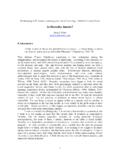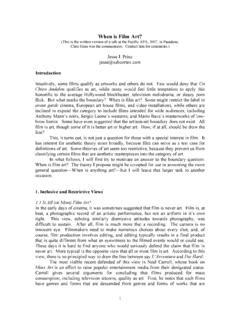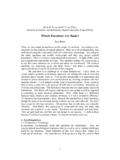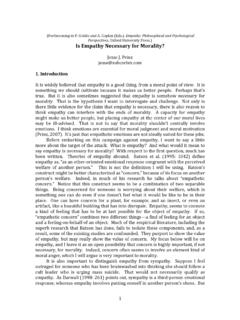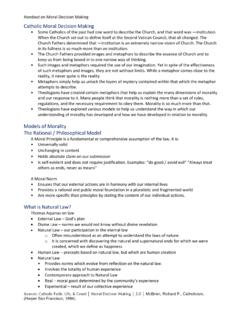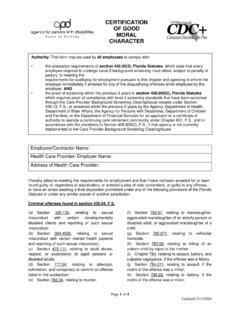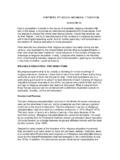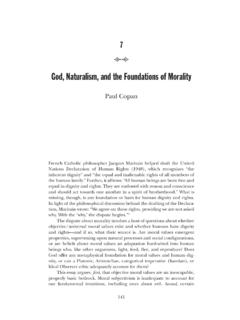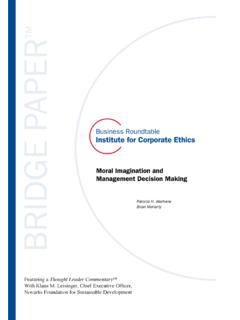Transcription of THE EMO TION AL B ASIS OF MORAL JUDGMENTS
1 ,cognitiveneuroscience,andresearchonpsyc hopathologyandconcludethatemotionsarenot merelycorrelatedwithmoraljudgmentsbutthe yarealso,insomesense, :first, ,Iarguethatmoralfactsareresponse- ,Iarguethataformofmotivationalinternalis mistrue:ordinarymoraljudgmentsareintrins icallymotivating, , sstudentsrefusedtotrythis, , tunderstandwhyhisstudentcamebackprematur ely, ,Iberatedmyself: Whatkindofcravencowardareyou? Finallyafterseveralunsuccessfultries,Iwe ntuptoapassengerandchokedouttherequest, Excusemesir,mayIhaveyourseat? sseat, , (quotedinBlass2004,174)Milgram ,Iwanttoexploretheconnectionbetweenemoti onandmoraljudgmentandofferadiagnosisofMi lgram , , ,March2006 ISSN1386-9795print/1741-5918online/06/01 0029-15#2006 Taylor& ,mostdirectly, , ,and,inthatregard, , :canonepossessamoralconceptwithouthaving certainsentiments?Butconceptualquestions arethorny,becausemanyofourconceptsaregra ded,opentextured,orpolysemous,andphiloso phicalintuitionsare,correlatively, ,Iwanttofocusonamoretractablequestiontoc onsider:doourordinarymoralconcepts(theon eswedeployintokenthoughtsmostfrequently) haveanemotionalcomponent?
2 Saquestionaboutwhatgoesoninourheadswhenw eusemoraltermslike good and bad or right and wrong .Empiricalquestionscanbeaddressedusingph ilosophicalmethods(philosophicalintuitio nscanbetreatedasdata), , , , ,Moll,deOliveira-Souza,andEslinger(2003) measuredbrainactivityassubjectsevaluated moralsentencessuchas, Youshouldbreakthelawwhennecessary incontrastwithfactualsentencessuchas, Stonesaremadeofwater .Inbothcases,sub-jectssimplyhadtoanswer right or wrong .Theyfoundthatwhensubjectsmademoraljudgm ents,asopposedtofactualjudgments, ,Sanfeyetal.(2003) , , (2002) ,subjectsweregivenastoryaboutadinnergues twho,aftertastingthefood, ,Greeneetal.(2001)foundemotionactivation assubjectsconsideredmoraldilemmas,and30 JESSEPRINZK aplan,Freedman,andIacoboni(forthcoming) ,includingrudeness,unfairness,law-breaki ng, , ,Schnall,Haidt,andClore(forthcoming) ,subjectsreadthat:Frank ,withacrustydrinkcup,achewedpencil,aused tissue, ,WheatleyandHaidt(forthcoming)hypnotized subjectstofeelapangofdisgustwhentheyhear dtheemotionallyneutralword often.
3 Theythenpresentedthesesubjectswithvignet testhateithercontainedtheword often , often judgethatthemorallyadmirablecharactersar emorallywrongwhenthatwordappearsinthevig nettes! ,Murphy,Haidt,andBjo rkland(forthcoming) , , ,afewsubjectssaidthatincestmightbeokayun derthesespecialcircum-stances,butthemajo rityinsistedthatincestisstillwronginsuch cases, , , ,childrenneedalotoftrainingtoconformtomo ralrules, ,thethreemaintechniquesEMOTIONALBASISOFM ORALJUDGMENTS31thatparentsusetoconveymor alrulesallrecruitemotions(Hoffman1983).O netechniqueispowerassertion(physicalpuni shmentorthreatofpunishment), ,whichelicitsdistressbyorientingachildto someharmshehascausedinanotherperson( Look,youmadeyourlittlebrothercry! ).Thethirdtechniqueislovewithdrawal,whic helicitssadnessthroughsocialostracism( Ifyoubehavelikethat,I mnotgoingtoplaywithyou!)
4 , ,becausetheyareprofoundlydeficientinnega tiveemotions, ,andtheyhaveremarkabledifficultyevenreco gniz-ingtheminfacialexpressionsandspeech sounds( ,2002).Psychopathsarenotamenabletofearco nditioning,theyexperiencepainlessintense lythannormalsub-jects,andtheyarenotdistu rbedbyphotographsthatcausedistressinus( ). ,theycannotacquireempatheticdistress,rem orse, ,butthereisgoodreasontothinkthattheydono thavemoralconcepts wrong ,Cleckley(1941) , butthereisnowayforhimtorealizethathedoes notunderstand .Blair(1995)investigatedmoralconceptsinp sycho-pathsmoredirectly, wrong asifitsimplymeant prohibitedbylocalauthorities . , ,wecansaythingslike, killingiswrong , , ,ifapersondidharborastrongnegativesentim enttowardskilling,wewouldsaythatshebelie veskillingtobemorallywrong, , ,wemightfindthatnegativeappraisalsbecome attenuated,especiallywhensubjectsarepres entedwithcasesthancannotbeeasilyassessed usingpla-titudessuchas killingiswrong.
5 Moralblindnessduetopositiveaffectmayexpl ainwhypeoplewhosufferfrommaniaareoftenpr onetoantisocialbehaviorduringmanicepisod es(AmericanPsychiatricAssociation1994,33 0).ThereisonefinalargumentthatI dliketomention, somethinglikereasonorobservation (reviewedinPrinz,forthcoming).TheGuhuku- GamaofNewGuineaandotherheadhuntersthinki tisokaytokillinnocentpeople;theGreekciti zensofPtolemaicEgyptmarriedtheirsiblings atarateofupto30%;theAztecsofMexicoandcou ntlesssmall-scalesocietiesindulgedincann ibalism;theRomansfilledarenastowatchglad iatorsslaughtereachother;Thongamenhavese xwiththeirdaughtersbeforehunting;thewome nofChinaenduredexcruciatingpainbybinding theirfeet;genderinequityandslaveryhavebe enwidelyaccepted, , :Southernwhitemenaremuchmorelikelythanth eirNortherncounterpartstomorallyapproveo fviolentreprisalsforpublicinsults, ,andmanyofthesedifferences(suchaspolygym yversusmonogamyorSouthernbellicosityvers usNortherndiplomacy) , , , ,however, savariantofanoldtheme,associatedwiththeB ritishmoralists, ,thetheorysays:Tobelievethatsomethingism orallywrong(right)istohaveasentimentofdi sapproba-tion(approbation) , , ,youwillfeeldelightedwhenyouseechocolate cakeonthemenu, ,likewise, , , , ,Imayexperienceanger,contempt, (1997) (prohibitionsagainstphysicalharmandright sviolations),therearerulesdesignedtoprot ectthecommunity(usuallypertainingtoranko rpublicgoods),andrulespertainingtotheper ceivednaturalorder(suchassexualmoresorre li-giousdietaryrules).
6 Itturnsoutthattheserulesareassociatedwit hdifferentemotions( ).Crimesagainstpersonselicitanger,crimes againstcommunityelicitcon-tempt, , ,Imayexperiencefury,butiftheharmispetty, , ,wemayexperiencesullenbrooding, ,whenwejudgethatsomethingiswrong,oneoran otheroftheseemotionswillordinarilyoccur, (oritscategoricalbasis), wrong wrong maybeidenticaltoemotions,butwecanhaveand self-ascribestandingbeliefsaboutwrongnes swithoutanyemotions , ,accordingtowhichmoralconceptsrefertores ponse-dependentproperties(seeDreier1990; Johnston1989;McDowell1985;McNaughton1988 ;Prinzforthcoming;Wiggins1991;Wright1992 ).Moraljudgmentsexpresssentiments, ,whichIregardasfeelingsofpatternedbodily changes(Prinz2004). ,Iascribetochocolatethepropertyofcausing , , , ,injustthewayweassumethatblueisafeatureo fsurfaces, ,butnotincoherenttosupposethattheydepend onreactionsinus.
7 (Comparetheconcept delicious .) ,iftheyrefertoresponse-dependentproperti es, wrong referstoaresponse-dependentproperty,whos eresponsesmatter?Andunderwhatconditions? Here,IthinksomethinglikeDreier ,Irefer(perhapsunwittingly)totheproperty ofcausingemotionsofblameinme.(Orperhaps, sayingthatsomethingiswrongmeansthatitcau sesemotionsofblameinus,wherethe us ) wrong referredtowhatevercausesdisapprobationin me, , wrong refersonlytothosethingsthatirkmeundercon ditionsoffullfactualknowledgeandreflecti on, :wrongisnotjustthattowardswhichIhaveasen timentofdisapprobation, ;thisisnottrueofchildren(Nichols2004).An ditalsorequiresthatwehaveaconceptofmoral warrant,asopposedtootherformsofwarrant,a ndthatriskstheintroductionofcircularityi ntheaccountofmoraljudg-ment(D ArmsandJacobson2000).Fortunately, ( ,Dretske1988;Fodor1990).Anyoneofthesemig htbeapplicablehere( ,knee-jerksentimentalreactionsmaybeasymm etricallydependentonreflectivereactions) .
8 Thereisalsoamorestraightforwardsolutiona vailable,oncewedrawadistinctionbetweenem otions(whichareoccurrentstates),andsenti ments, , , ,wedonotneedtohavemetacognitivepoliciesc oncerningoursentiments(thoughwemight);ra ther, wrong means wrongforme ,andIsayit snotwrong, ,ifwehavethesamebasicmoralvalues,thenwro ng-for-meandwrong-for-youmaybeextensiona llyequivalent; ,wehavegoodreasontodebatebecausemorality haspracticalconsequences, ,but,inhumanlife, , ,thereisagoodexplanationforwhywethinkour debateislegitimate:wetendtoprojectsentim entalpropertiesontotheworld(deliciousnes s,likeability,funniness) ,theclaimthatmoraldebatesarespuriousexpl ainswhysomanyseemtobeinterminable; , , , ,influencemoraljudgments,aresufficientfo rmoraljudgments,andarenecessaryformoralj udgments,becausemoraljudgmentsareconstit utedbyemotionaldispositions(eitherstandi ngdispositionsormanifestdispositions).
9 Atleastourordinarymoralconceptsseemtohav ethischaracter(Iwilldiscusssomeabnormalm oraljudgmentsbelow).ExplanatoryFruitsThe sentimentalisttheoryofmoraljudgmentexpla instheempiricaldatapresentedearlier, , , , ,thinkingthatanactioniswrongdisposesonet ohavingnegativeemotionstowardsit,andnega tiveemotionsareinhibitory:theypromoteavo idance,ceasing,intervention,withdrawal,a nd,whenanticipated, ; , , ,sentimentalismoffersanattractiveexplana tionofthedistinctionbetweenmoralandconve ntionalrules(compareBlair1995,Nichols200 4).Bythetimechildrenare3,theyrecognizeth atsomerulesaremoral( ,don thitotherchildren)andothersaremerelyconv entional(don ttalkwithoutraisingyourhand). s36 JESSEPRINZ okaytotalkwithoutraisingyourhand,thentha t sokaytohitthechildnexttoyou, ,itmakesusfeelbad, , ,butembarrassmentiskeyedtothereactionsof others, , , ,conventionalrulesofeti-quettethatnatura llyelicitnegativeemotionswhenviolated( ,spittinginpublic)maybemorelikelytobetre atedmoralisticallythanotherrulesofetique tte(Nichols2002).
10 ; ,and, , , ,farfromopposingintuitionism, , ,andtheyrefertoresponse-dependentpropert ies, , , ,themoralterms right and wrong expresssentiments,andthetokenjudgmenttha tsomethingisrightorwrongmayexpressanoccu rrentmanifes-tationofasentiment, ,Imayexperienceanger, , , , , ,andIcantrulyself-ascribethissentiment, , ,however, , ,ifIamneveroutragedbygenderdiscriminatio n, ,theycanconcludethathead-huntersfindsuch murdersmorallycommendable; , ,givenhead-huntingmorality;theycannotcon cludethathead-hunters ought ought weexpressourownsentiments, is butnotanoughtfroman is .Wecanmakedispassionatejudgmentsaboutmor als, , ,psychopathsareascloseaswecanfindtoamor- alists:whentheysaythatkillingiswrong, ,theydonotevengetourmoralityright; right and wrong ,buttheycan , ,wemakejudgmentsthatexpresssentiments, , ,therearejudgmentsthatrefertothemotivati onalstatesofothers, , , , , (thoughseeKennett2002,foradifferentasses smentoftheempiricalevidence).
